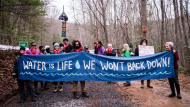Will US banks become the next target for activists fighting the Mountain Valley Pipeline?
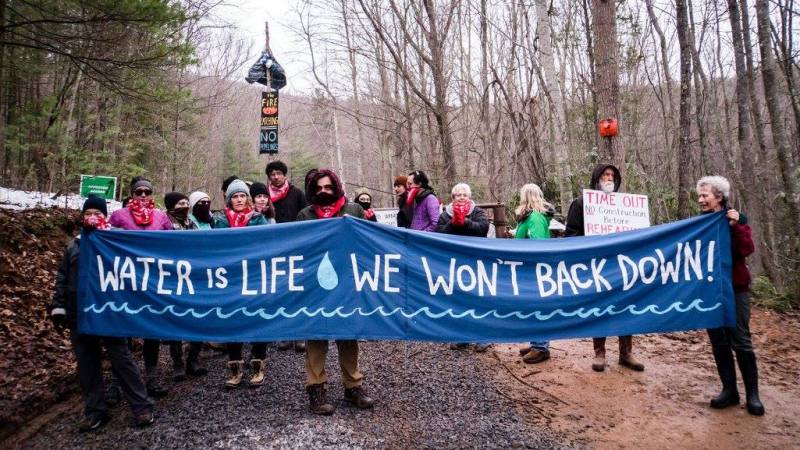
This is a Frontline Story to accompany the 2023 Banking on Climate Chaos report, produced in collaboration with Protect Our Water, Heritage, Rights (POWHR) and 7 Directions of Service.
When US President Joe Biden signed the debt ceiling bill on Friday, June 2, 2023, it placed the Mountain Valley Pipeline in the spotlight once again, thanks to sweeping provisions in the bill that expedites approvals of permits needed to complete this controversial project.
The methane gas pipeline would run from West Virginia to Virginia, with a proposed Southgate extension into North Carolina. It has been stalled for years due to fierce community resistance and the company’s negligence and unethical construction practices. These negligent practices thwarted environmental laws, resulting in over 400 water quality violations and led to various court challenges. Unfortunately, the pipeline is likely to move forward due to a provision in the debt ceiling bill that attempts to quash existing lawsuits against the pipeline project.
This disappointing move by Congress and President Biden means climate activists are exploring additional strategies to stop the pipeline. In addition to frontline protests, regulatory processes, and legal appeals, activists are now increasing their pressure on the financial backers of the pipeline to pull out of the deal.
Targeting big banks
Over the past several years, climate activists have turned their attention to big US banks, asset managers, and insurance companies as instrumental to the climate fight. These major financial institutions enable the fossil fuel industry to continue to expand. Banks and financial institutions hold deep relationships with many of the companies behind proposed fossil fuel projects, and activists are increasingly calling on major financial institutions to live up to their climate promises by ending their financial support for projects like the Mountain Valley Pipeline.
From Appalachia frontline groups like Protect Our Water, Heritage, Rights (POWHR) and Indigenous-led 7 Directions of Service to national advocacy organizations like Oil Change International, Rainforest Action Network and the Sierra Club, climate advocacy groups are becoming increasingly savvy in their campaigning against not just the companies behind projects like the Mountain Valley Pipeline, but the financial backers as well.
“People power has successfully stopped construction of the Mountain Valley Pipeline so far, and we won’t back down now,” said Denali Nalamalapu, Communications Director at POWHR. “If Congress wants to take away our legal avenues to fight this project, then we will take it to the next level by targeting the financial backers of this project. We are issuing a warning to the big US banks providing financing to the companies behind the Mountain Valley Pipeline: Our global movement is stronger than ever and the big banks should expect to be hearing more from us in the coming months. We will never stop fighting this unfinished, unnecessary, and unwanted project.”
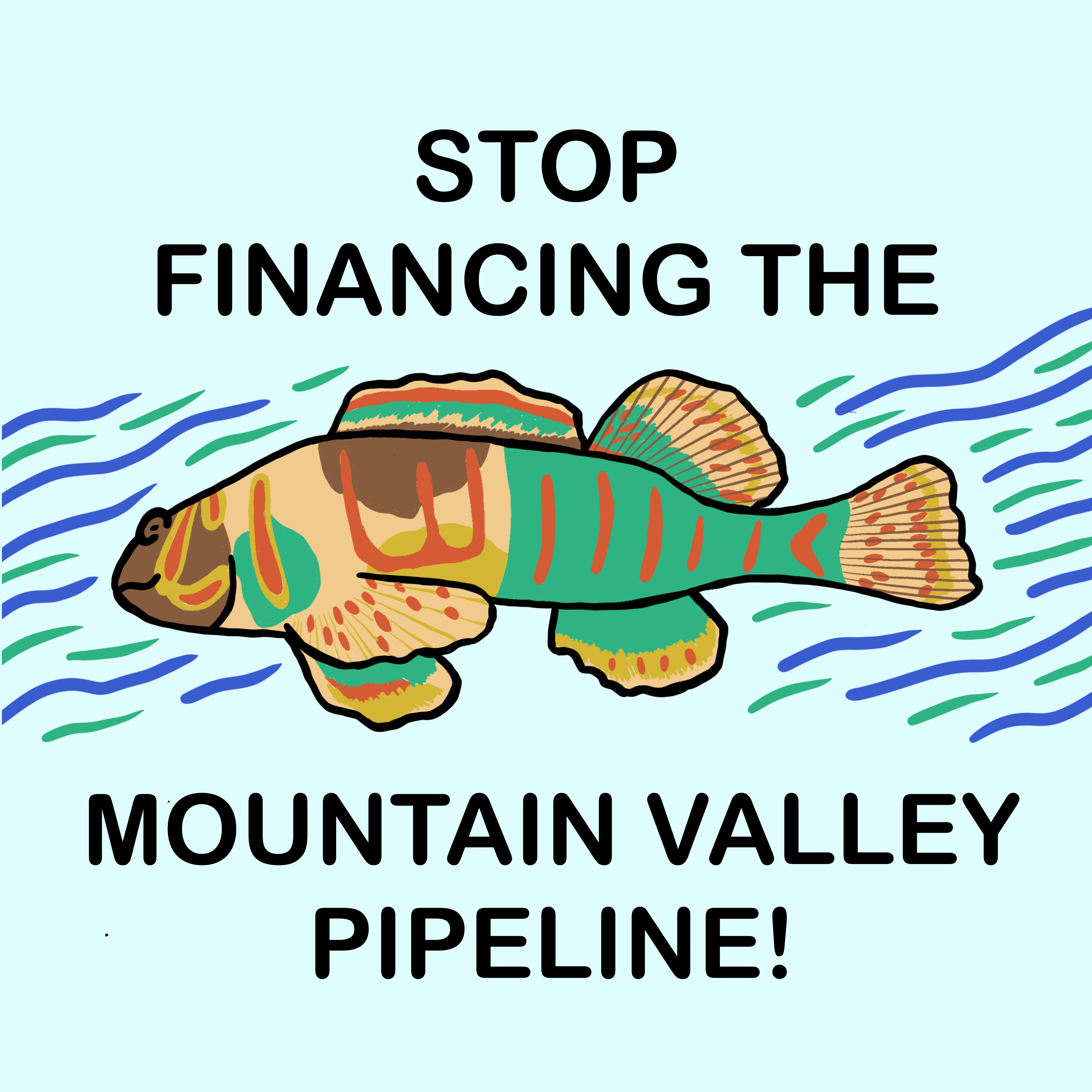
Banking on Climate Chaos
The annual Banking on Climate Chaos report reveals that several big U.S. and international banks — Bank of America, JPMorgan Chase, Wells Fargo, and PNC in the U.S. and BNP Paribas in France — provide key financing to the companies behind the Mountain Valley Pipeline, a joint venture of EQM Midstream Partners, NextEra Energy Resources, Con Edison Transmission, WGL Midstream, and RGC Midstream.
Three of the US banks backing the Mountain Valley Pipeline – Bank of America, JPMorgan Chase, and Wells Fargo — are among the biggest fossil fuel financiers in the world, according to the annual Banking on Climate Chaos report. JPMorgan Chase is the world’s biggest funder of climate chaos since the Paris Agreement was signed in 2016, with Wells Fargo and Bank of America also among the top 5 fossil fuel financiers since 2016.
All three of these banks have made climate pledges to reach net zero emissions by 2050. However, they continue to increase their financing for fossil fuels, pouring billions into the companies expanding fossil fuel production every year. This financing is completely counterintuitive to statements from the world’s preeminent energy experts, which concluded in 2021 that meeting international climate goals requires “no new fields or export projects are developed” — including projects like the Mountain Valley Pipeline.
Banks claim to be committed to reducing their financed emissions and driving the clean energy transition, when in reality, they are mostly continuing with business as usual. Meanwhile, politicians and fossil fuel executives insist that construction on the Mountain Valley Pipeline is mostly done, when in reality, it’s only 56% complete and many of the most problematic elements of construction remain.
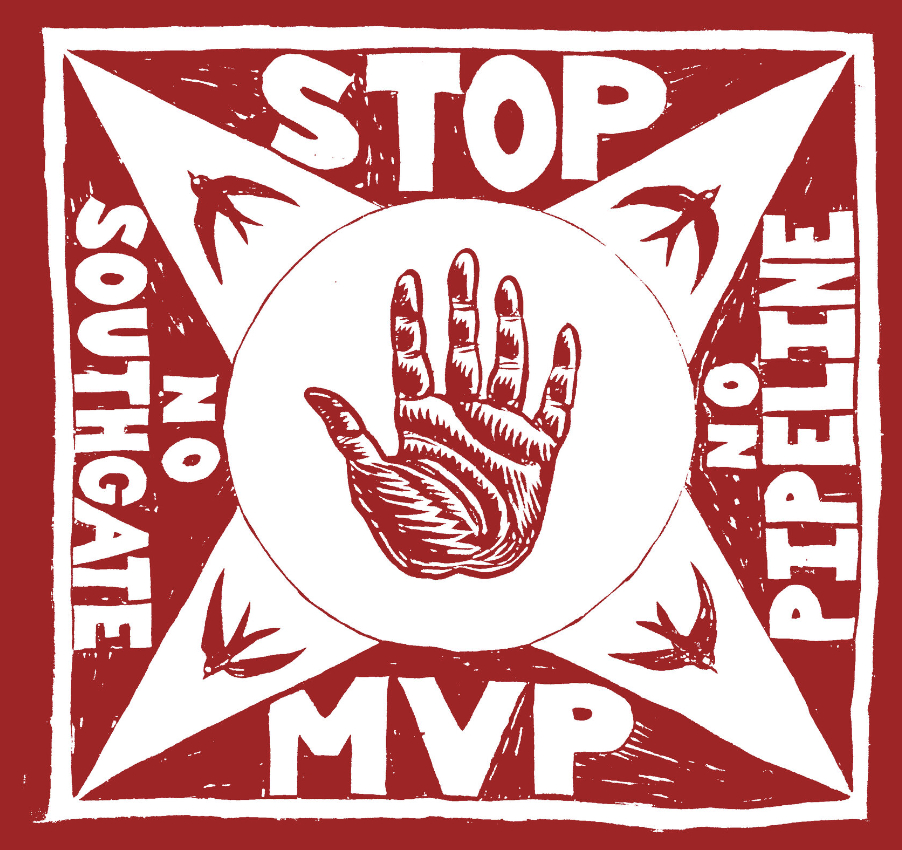
Community opposition
Groups like POWHR have been fighting the Mountain Valley Pipeline for years, including performing the important work of monitoring the environmental pollution from its construction. The community initiative Mountain Valley Watch documents problems incurred by the construction of Mountain Valley Pipeline, including clogged streams and rivers due to dirty runoff, destabilized mountain slopes, and blasted underground caves. Volunteers track and report possible regulatory violations in order to pressure government agencies to uphold their duty to protect lands and waters.
Other groups like West Virginia Rivers also train volunteers to identify, document, and report pollution by the pipeline’s construction. There are at least three key rivers in the path of the pipeline — the Gauley River, the Greenbrier River and the Elk River, which is the drinking water source for the City of Charleston and more than 300,000 people. In addition to these major river crossings, more than 80% of the pipeline’s stream crossing are headwater streams.
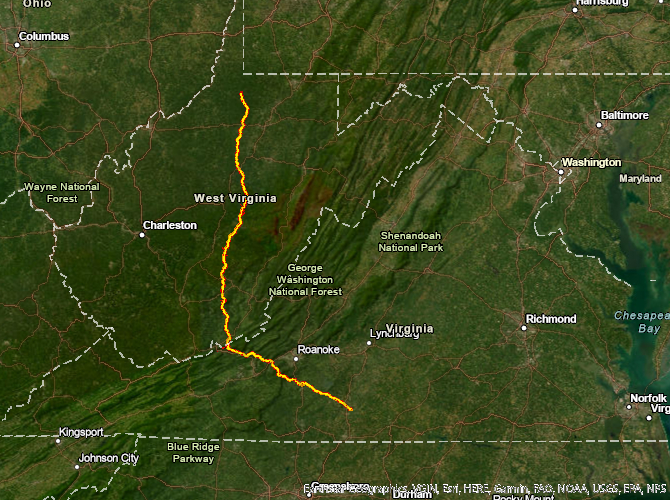
A map made by Mountain Valley Watch shows the “blast zones” along the pipeline route, revealing land that is at risk of being impacted if the pipeline ever exploded. Several of these “blast zones” are in environmental justice communities in southern Virginia.
A 2022 report from Appalachian Voices detailed the scope of the remaining work on the pipeline, as well as the harms that local communities have already experienced, including degraded drinking water, damaged farmland, and harm to Indigenous sacred sites.
According to the report, the pipeline’s construction has already impacted sites on the traditional homeland of the Monacan Indian Nation (federally recognized in 2018), and the Occaneechi, Saponi and Tutelo tribes, including a burial mound near Roanoke, Virginia, dating back several thousand years. Requests by tribes for consultation with federal regulators to ensure cultural resources were protected were largely ignored.
Next steps
With the debt ceiling bill’s sweeping provisions to approve the Mountain Valley Pipeline, climate activists are once again frustrated by the disconnect between the Biden administration’s stated climate goals and its continued approval of fossil fuel projects. Politicians are to blame for putting the Mountain Valley Pipeline squarely in the crosshairs for the next stage of the climate fight. The project’s financial backers should take note.
In June, communities rallied outside the White House in and across the country to send a powerful message to President Biden, the fossil fuel industry, and big US banks: No more fossil fuels! Sign a petition calling on your elected officials to publicly oppose the Mountain Valley Pipeline here.

